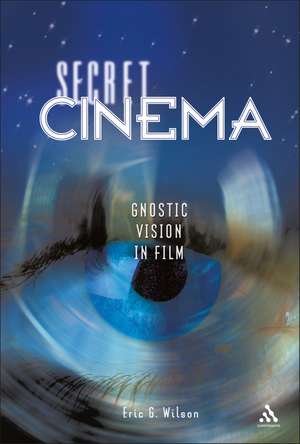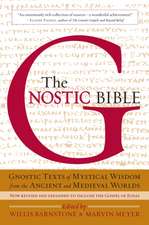Secret Cinema: Gnostic Vision in Film
Autor Eric G. Wilsonen Limba Engleză Hardback – 30 noi 2006
| Toate formatele și edițiile | Preț | Express |
|---|---|---|
| Paperback (1) | 138.62 lei 6-8 săpt. | |
| Bloomsbury Publishing – 30 noi 2006 | 138.62 lei 6-8 săpt. | |
| Hardback (1) | 673.33 lei 6-8 săpt. | |
| Bloomsbury Publishing – 30 noi 2006 | 673.33 lei 6-8 săpt. |
Preț: 673.33 lei
Preț vechi: 1065.00 lei
-37% Nou
Puncte Express: 1010
Preț estimativ în valută:
128.85€ • 133.71$ • 107.70£
128.85€ • 133.71$ • 107.70£
Carte tipărită la comandă
Livrare economică 15-29 martie
Preluare comenzi: 021 569.72.76
Specificații
ISBN-13: 9780826417961
ISBN-10: 0826417965
Pagini: 176
Dimensiuni: 160 x 236 x 19 mm
Greutate: 0.45 kg
Editura: Bloomsbury Publishing
Colecția Continuum
Locul publicării:New York, United States
ISBN-10: 0826417965
Pagini: 176
Dimensiuni: 160 x 236 x 19 mm
Greutate: 0.45 kg
Editura: Bloomsbury Publishing
Colecția Continuum
Locul publicării:New York, United States
Caracteristici
Explores the Gnostic nature of film and and the Gnostic knowledge that the acts of filmmaking and filmgoing produces
Cuprins
Prologue: Gnosticism in the Postmodern AgeiIntroduction: Gnosis and Film1Chapter One: Gnostic Cinema: The Blank Screen55Chapter Two: Cabbalistic Cinema: The Illuminated Projector116Chapter Three: Alchemical Cinema: The Dark Theater172Epilogue: The Gnostic Romance235Endnotes240Filmography256Bibliography262v
Recenzii
Title mention in Baptist Times, November 2007
'this book reminds us all that film is now the preferred medium for spiritual exploration in our culture. Film buffs may well be intrigued by the detailed discussions of these 'Gnostic' movies, but all Christians should appreciate that there is a missional opportunity here.' The Revd Dr John Drane, Baptist Times
'this book reminds us all that film is now the preferred medium for spiritual exploration in our culture. Film buffs may well be intrigued by the detailed discussions of these 'Gnostic' movies, but all Christians should appreciate that there is a missional opportunity here.' The Revd Dr John Drane, Baptist Times









